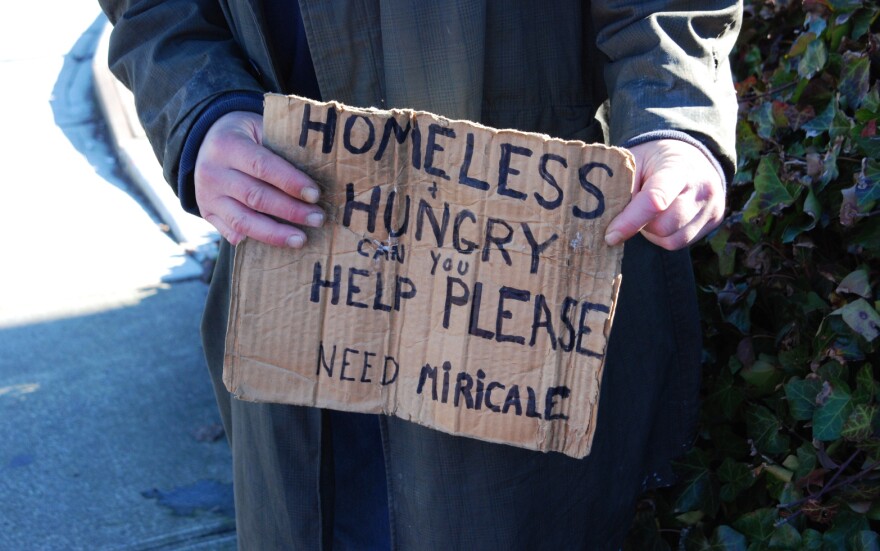The 211 hotline is designed to be a 24/7, one-stop shop for people who need assistance — including homeless people in dire need of shelter.
Officials in St. Louis and St. Louis County often tout calling 211 as the best way to find a bed in the region’s patchwork of shelters. But a number of homeless outreach volunteers say the government-funded system falls woefully short after regular business hours. Instead, the burden to secure shelter placements is falling on volunteers.
In fact, major St. Louis hospitals are relying on one volunteer, not 211, to find shelters with room for the homeless people they discharge. Nicole Warrington is unpaid and has no official role with 211 or the city — yet, over the past year, social workers at hospitals have called her 400 times. She then reaches out to her personal network of service providers and shelters to try to secure each person a place.
If 211 was working the way city officials publicly suggest, Warrington said those calls would not be necessary.
“We need a system for local emergency rooms who are getting folks who simply need housing,” she said on Tuesday’s St. Louis on the Air. “That's why they're going to the ER.”
By day, Warrington is a staff scientist in cancer research at Washington University and has volunteered with local grassroots organizations for over five years. She said she has no idea how hospital staffers got her number, yet she dutifully answers their calls around-the-clock.
Sometimes, she said, she feels obligated to share when she’ll be out of pocket, simply because she knows how many people are relying on her.
“Particularly on the coldest nights, I'll message the network of folks who call me and say, ‘I am out of commission for the next 90 minutes, I will respond to texts or calls afterwards,’” she said.
Both the City of St. Louis and St. Louis County contract with United Way-backed 211 to connect people to shelter. The two entities combined pay $176,000 annually for the service, 211 officials said. The hotline has operators specializing in housing-specific issues from 7:30 a.m. to 5 p.m. every weekday.
But volunteers say the need is particularly acute in evening hours. Weather can quickly change in Missouri, and people who are homeless are not always prepared for the cold. Audra Youmans is a St. Louis University student and volunteer with local homeless services who’s seen that firsthand.
“It's easier and more sustainable to not have a place to go during the day than it is at night,” Youmans said. “Everyone wants to save space to sleep.”
In February, Youmans started recording 211 phone calls and sending them to city officials and United Way leaders. Operators on calls she shared with St. Louis Public Radio displayed a lack of knowledge about how to connect people to the local shelter system — and some even gave the wrong times for when the housing hotline was open. But Youmans said leaders either did not believe her or blamed individual employees for the lack of information.

“I felt I was being misled or lied to, or gaslit,” Youmans said.
A spokesperson for the city promised that it took such complaints seriously, saying the Department of Human Services "works to improve the systems of care for the most vulnerable through addressing any concerns raised and leveraging relationships to strengthen the safety net of services.”
211’s spokesperson said the hotline expects its specialists “to provide accurate information to callers at all times. We do take your findings seriously, and we will continue to focus on staff training as needed.”
Robin Pokojski, vice president of community partnerships at United Way of Greater St. Louis, said that housing requests make up the bulk of calls to 211 — with 40% of callers in the St. Louis region seeking housing services. She said 211 does not track the success rate of requests for shelter.
“There's a point where we are no longer engaged and we don't have insight into whether or not the person actually got placed,” Pokojski explained. And she noted that, sometimes, the problem is beyond the dispatcher’s control. “If you call today and there's no beds available, you're going to have to keep calling back until one becomes available,” she said.
Pokojski said United Way is working on creating a centralized system that incorporates providers to allow for better communication — but it’s in the beginning stages. Warrington, the volunteer who answers hospital calls, said the city and 211 leaders seem to lack urgency when it comes to addressing the issue.
“Tomorrow might be too late if you're going to get frostbite tonight or even die,” Warrington said.
“St. Louis on the Air” brings you the stories of St. Louis and the people who live, work and create in our region. The show is hosted by Sarah Fenske and produced by Emily Woodbury, Kayla Drake, Danny Wicentowski and Alex Heuer. Jane Mather-Glass is our production assistant. The audio engineer is Aaron Doerr.
Send questions and comments about this story to feedback@stlpublicradio.org.
Support Local Journalism
St. Louis Public Radio is a non-profit, member-supported, public media organization. Help ensure this news service remains strong and accessible to all with your contribution today.





